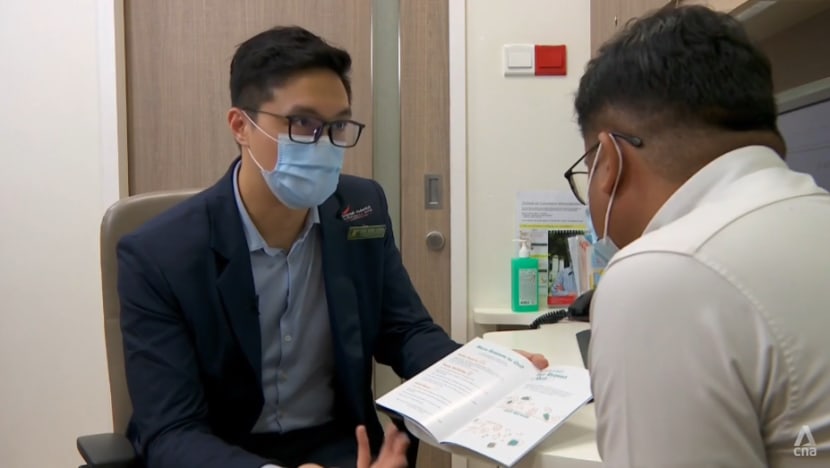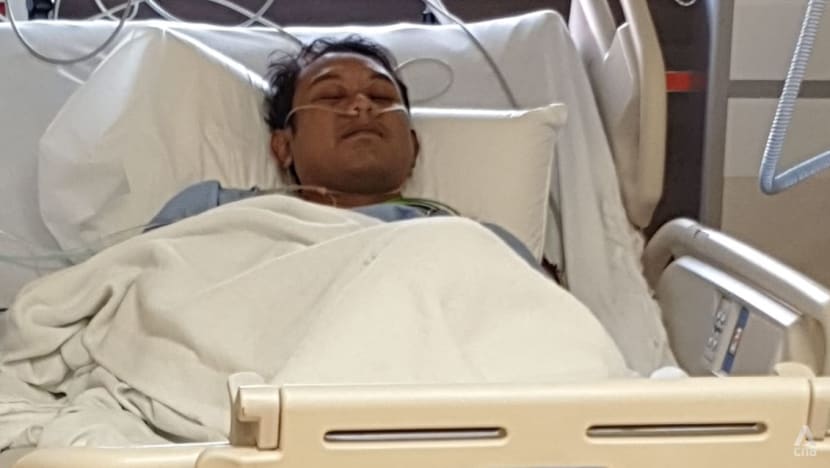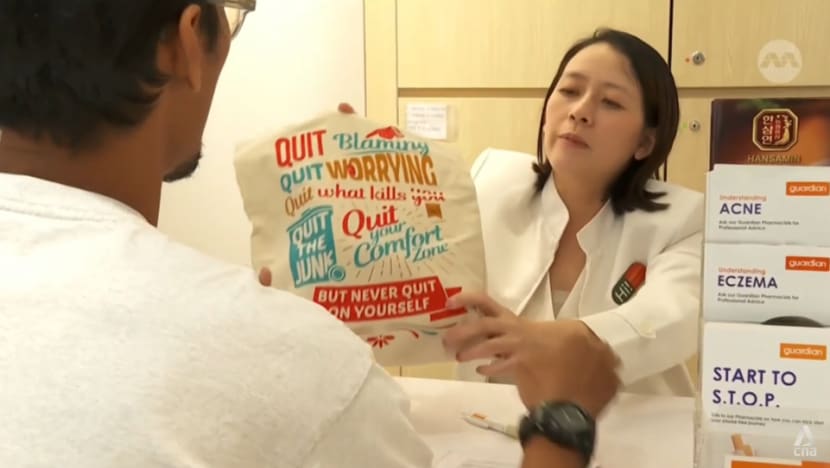Vaping clouds efforts by cessation clinics to help smokers quit for good
While demand for professional help to quit cigarettes remains strong, healthcare personnel say the evasive habit of vaping is tripping up their efforts to help smokers stub out for good.

A counsellor speaks to a patient during a session at a smoking cessation clinic in Singapore.

This audio is generated by an AI tool.
SINGAPORE: Mr Dandiar Rosli used to burn through a pack of cigarettes a day.
In an effort to kick the habit a few years ago, he turned to electronic vaporisers, commonly known as vapes, believing they were a healthier choice that would wean him off cigarettes.
Two months into vaping, however, he started waking up in the middle of the night with coughing fits that produced yellowish-green phlegm.
Mr Dandiar, who was 34 back then, was also constantly breathless and panting even while sitting or lying down.
Doctors advised him to go for bronchoscopy – a visual examination of the air passages and lungs with the help of a thin tube through the nose or mouth.
Feeling stressed, he smoked yet another cigarette before going to Singapore General Hospital (SGH) for the procedure.
At the hospital, his blood oxygen level was so low that nurses were preparing life-saving measures.
“The nurses were all panicking. I was also panicking,” he recalled. “Everyone thought they needed to resuscitate me.”

He was unconscious for four days and spent almost two months in the intensive care unit (ICU).
Mr Dandiar went through a lung lavage treatment to remove protein build-up in the air sacs that was hindering his breathing. Without the procedure, he could have died.
"I left everything to fate. I told my wife: ‘If I live, I live. If I die, I die.’ I didn’t know what was going to happen,” he said.
The private driver told CNA he is lucky to be alive, and breathing normally.
However, the nicotine addiction is a constant battle, and Mr Dandiar has to persistently work on staying off the tobacco.
“I still have that urge. When I’m stressed, I feel like smoking but I quickly find something to distract myself,” he said. “It's a choice (every time) and I really have to (constantly) make that choice not to smoke.”
SMOKING CESSATION CLINICS
Many smokers like Mr Dandiar find it difficult to resist the urge to reach for a cigarette.
“Smoking addiction is very difficult to overcome. A smoker experiences withdrawals and cravings, which he may not be able to overcome on his own,” said Dr Ken Lee, a senior consultant at SGH’s Department of Respiratory and Critical Care Medicine.
To help them on their smoke-free journey, numerous programmes are available across Singapore’s healthcare institutions and pharmacies.
For those who went through medical treatment for lung injuries caused by smoking, doctors typically refer them to smoking cessation clinics.
Counsellors at such clinics help each patient plan clear, customised milestones, and may recommend nicotine replacement products if they are deemed to be helpful.
A majority of patients in such clinics are men aged between 40 and 70.
During a consultation session that CNA observed, a counsellor first examined a patient’s history of smoking, assessed his daily stressors and concerns and discussed his expectations and goals, before giving advice and recommending medication.
EASIER ACCESS TO PROFESSIONAL HELP
Smokers seeking to quit can also walk in to participating pharmacies such as some Guardian outlets to get help from professionals.
Compared to hospitals, clients at these support centres tend to be younger men in their 40s, who have not had any major health treatment related to smoking. They cite family, health and finance as their key motivations to stub out.

Pharmacists there advise smokers on personalised quitting plans, check in on their smoke-free journey and if needed, recommend nicotine replacement products that come in the form of patches, lozenges, gums and mouth sprays.
VAPING CLOUDS EFFORTS
However, counsellors are finding it difficult to assess a patient's level of nicotine addiction if they are vaping.
“We often hear questions hinting towards vaping, but when we try to find out more, clients tend to be evasive. They don't want to share so much, especially because it's illegal,” said Ms Grace Chew, principal pharmacist at Guardian Jurong Point.
Vaping is against the law in Singapore and offenders can be fined up to S$2,000 (US$1,500).
Medical professionals said that vaping could potentially be even more addictive compared to cigarettes, as the electronic products could carry higher nicotine content.
“The amount of nicotine varies between the different vape devices' cartridges. In fact, vape users can adjust the voltage to determine how much vapour they want to inhale,” said Dr Lee.
He warned that vapes contain toxic chemicals that can cause significant harm to health, including lung injuries such as inflammation to the airways.
He added that as vapes are so new, there is not yet enough data to know the full extent of the harm they can cause.
Counsellors said they have tweaked their programmes to tackle vaping as well.
PROFESSIONAL HELP REDUCES RELAPSES
Studies have indicated that about 75 per cent of those trying to quit smoking experience relapse within six months.
Mr Dandiar knows the dangers of relapses all too well. A few months after his operation, he started smoking again and was sent back to the ICU for another painful extraction of protein build-up in his lungs.
“It’s really, really tough to quit. It’s a habit, an addiction. Many can never quit unless they go through some tough times. A health scare will really change your perspective on smoking,” he said, adding that since then, he has been smoke-free for two years.
Doctors said that professional help boost their chances of quitting.
“Professional counselling can help patients cope with stressors in life, teach them techniques and recommend appropriate medication, which can help them overcome cravings and cope with the withdrawal symptoms,” said Dr Lee.
He added that the addiction is difficult to overcome by just willpower, with a success rate of just around 3 to 5 per cent if a smoker goes cold turkey individually.
With professional help, a significantly higher number of patients – about 20 to 30 per cent – are able to wean off the tobacco.
He added that smokers willing to attend more counselling sessions stand a higher chance of kicking the habit for good.




















